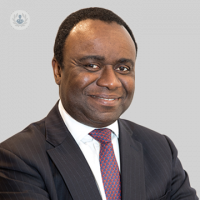Early warning signs of spinal stenosis
Written in association with:For many of us, back pain can be successfully managed through medication, getting enough exercise, and in some cases physiotherapy. However, if you are finding that your symptoms do not improve, and you are over the age of 60, your pain could be due to a degenerative condition called spinal stenosis. In this article, expert orthopaedic surgeon Dr Colin Nnadi discusses what symptoms to look out for in spinal stenosis and how it can be treated.
What is spinal stenosis?
Spinal stenosis is a narrowing of the spinal canal that puts pressure on the nerves within the spine. Sometimes the narrowing can be caused by a slipped disk, fracture, or tumour, but more commonly it is a degenerative, age-related condition.
Spinal stenosis can occur in different parts of the spine. When it occurs in the lower back it is called lumbar stenosis, and when it occurs in the neck it is called cervical stenosis. Lumbar stenosis is much more common.
Where spinal stenosis is the result of a degenerative condition, symptoms appear gradually over time. Most people with the condition will see their condition remain stable in the long term, even without treatment.
What are the symptoms of spinal stenosis?
Some people will have spinal stenosis without knowing it, because they don’t experience any symptoms.
Where spinal stenosis does cause symptoms, these can include:
- lower back pain
- mild or severe pain in the legs and posterior
- numbness, tingling or weakness in the legs and feet
- in the case of cervical stenosis, you might also get pain or numbness in your hands and arms
- in severe cases, the function of the bladder might be affected.
It’s important to see the GP if you experience any of these symptoms, because loss of function does not automatically return even after treatment.
One of the things which differentiates spinal stenosis from other conditions with the symptoms described above is that symptoms feel worse when your body is in a certain position. For example, you might find it easier to walk uphill than dowhill, or find it easier to cycle rather than walk.
How is spinal stenosis diagnosed?
The doctor is likely to examine you to check where the pain is and when it occurs, to determine whether the cause of your pain or numbness is spinal stenosis or something else such as a tumour, fracture, infection, or even a problem with the blood supply to your legs.
If the doctor suspects spinal stenosis they will refer you for an MRI scan. If you can’t have an MRI, it is likely you will have a CT scan instead.
How is spinal stenoisis treated?
Spinal stenosis can be treated in many ways. Non-surgical treatments can include:
- physiotherapy
- taking painkillers
- engaging in light physical activity such as stationary cycling
- use of a walking aid
- spinal injection therapy to reduce swelling and inflammation
If the pain and numbness is really affecting your quality of life, surgery will be considered. The procedure is commonly known as spinal decompression. Most people will respond well to surgery, but of course the risk of complications can increase with age, or in people with other medical conditions, so the doctor should discuss with you any risks beforehand.
If you’re worried about any back pain and numbness, book a consultation with Mr Colin Nnadi now.



